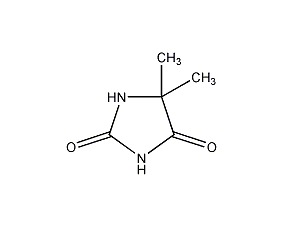5,5-Dimethylhydantoin 5,5- Dimethylhydantoin


Structural formula
| Business number | 01M0 |
|---|---|
| Molecular formula | C5H8N2O2 |
| Molecular weight | 128.13 |
| label |
5,5-dimethylimidazolidine-2,4-dione, 5,5-Dimethylhydantoin, dimethylhydantoin, Acetyl methylurea, 5,5-Dimethylhydantoin, 5,5-dimethylhydrone, 5,5-Dimethyl-2,4-imidazolidinedione, acetone urea, Urea acetone, gamma-Dimethylhydantoin, 5,5-Dimethyl-2,4-imidazolidinedione, 5,5-Dimethyl-2,4-dioxotetrahydroimidazole, 5,5-Dimethylimidazolidine-2,4-dione, Resin for insulation materials |
Numbering system
CAS number:77-71-4
MDL number:MFCD00005266
EINECS number:201-051-3
RTECS number:MU0977000
BRN number:2827
PubChem number:24893496
Physical property data
1. Appearance: White prism crystal or crystalline powder
2. Density (g/mL, 25/4℃): Uncertain
3. Relative steam Density (g/mL, air=1): Uncertain
4. Melting point (ºC): 175℃
5. Boiling point (ºC, normal pressure): Uncertain
p>
6. Boiling point (ºC, 5.2kPa): Uncertain
7. Refractive index: Uncertain
8. Flash point (ºC): Uncertain
p>
9. Specific rotation (º): Uncertain
10. Autoignition point or ignition temperature (ºC): Uncertain
11. Vapor pressure (kPa , 25ºC): Uncertain
12. Saturated vapor pressure (kPa, 60ºC): Uncertain
13. Heat of combustion (KJ/mol): Uncertain
14. Critical temperature (ºC): Uncertain
15. Critical pressure (KPa): Uncertain
16. Log value of oil-water (octanol/water) partition coefficient : Uncertain
17. Explosion upper limit (%, V/V): Uncertain
18. Explosion lower limit (%, V/V): Uncertain
19. Solubility: soluble in water, hexanol, ethyl acetate, dimethyl ether, slightly soluble in isopropyl ketone, acetone, methyl ethyl ketone, insoluble in aliphatic hydrocarbons and trichlorethylene
Toxicological data
1. Acute toxicity
Rat caliber LD50: 7800mg/kg; mouse subcutaneous LD50: 2800mg/kg;
Mouse LD50: 10mg/kg;
Rabbit caliber LD50: 12660mg/kg;
Pig caliber LD50: 8430mg/kg; Pig LD50: 5600g;
Nurturing animal LD50: 15950g;
2. Other multiple dose toxicity data
Rat caliber LD50: 2464 mg/kg/22W-I
Ecological data
None yet
Molecular structure data
1. Molar refractive index: 30.11
2. Molar volume (cm3/mol): 112.1
3. Isotonic specific volume (90.2K ): 263.7
4. Surface tension (dyne/cm): 30.5
5. Polarizability (10-24cm3): 11.93
Compute chemical data
1. Reference value for hydrophobic parameter calculation (XlogP): None
2. Number of hydrogen bond donors: 2
3. Number of hydrogen bond acceptors: 2
4. Number of rotatable chemical bonds: 0
5. Number of tautomers: 5
6. Topological molecule polar surface area 58.2
7. Number of heavy atoms: 9
8. Surface charge: 0
9. Complexity: 174
10. Number of isotope atoms: 0
11. Determine the number of atomic stereocenters: 0
12. Uncertain number of atomic stereocenters: 0
13. Determine the number of chemical bond stereocenters: 0
14. Number of uncertain chemical bond stereocenters: 0
15. Number of covalent bond units: 1
Properties and stability
The current main industrial product is low viscosity (1.5~2.5Pa·s, 25℃) methylhydantoin epoxy resin. Hydantoin epoxy resin has low viscosity and good process performance. Its viscosity is much lower than bisphenol A epoxy resin. It has good process performance without adding diluent. It has good thermal stability, high heat resistance, and its insulation The potting material can be used for more than 5000 hours at 180°C and has a service life of 40 years at 130°C. It has good weather resistance. The coating is not easy to yellow and powder when exposed to sunlight or ultraviolet rays, and its performance is better than that of bisphenol A-type rings. Oxygen resin and acrylic resin coatings are also outstanding in their salt spray resistance and corrosion resistance; they have outstanding electrical properties under high voltage and ultra-high voltage, especially excellent arc resistance and leakage trace resistance; they have strong polarity and viscosity Low, so it has good wetting ability and adhesion to glass fiber, carbon fiber and various fillers. A large amount of fillers can be added without reducing the processability, thereby reducing the linear expansion coefficient and cost.
Storage method
Store dry and sealed.
Synthesis method
It is obtained by reacting acetone cyanohydrin and ammonium carbonate aqueous solution at 50-80°C.
Purpose
It is used in the synthesis of amino acids, and can also be used as special epoxy resin and water-soluble resin, bactericide, preservative, etc. Its derivatives such as 1,3-dichloro-5,5-dimethylhydantoin can be used as chlorinating agent and disinfectant, 3-hydroxymethyl-5,5-dimethylhydantoin Can be used as formaldehyde agent, preservative, etc.